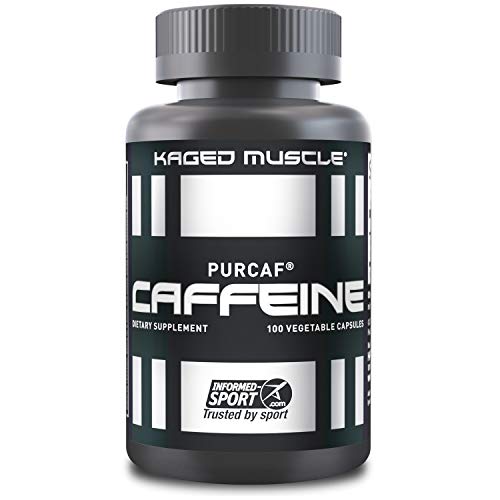Caffeine is a substance from the xanthine alkaloids. Its scientific name is trimethylxanthine and caffeine can be found in coffee beans, tea leaves, and other plants. Caffeine is a direct stimulator of the central nervous system. It is known mostly for its ability to temporarily suppress sleepiness and to regain sharpness of alertness.
When it is found in coffee, it is called caffeine, when it is found in tea – theanine, when it is found in Guarana – guaranine, in Yerba Mate – mateine, etc. The Food Standards Agency in the UK indicates the dose of 300 mg of caffeine per day for safety. Other sources vary in their recommendations for safe dosages between 180 to 450 mg of caffeine per day.
Top 5 Best Selling Caffeine Supplements
Product | Name | Buy on iHerb | Buy on Amazon |
|---|---|---|---|
#1 ALLMAX Nutrition Caffeine | |||
#2 Primaforce Caffeine | |||
#3 GAT Caffeine Metabolism | |||
#4 Nutrex Research Caffeine | |||
#5 Kaged Muscle PurCaf Caffeine |
What Is Caffeine and How Does It Enter Our Bodies
Caffeine is a substance from the xanthine alkaloids. Its scientific name is trimethylxanthine and caffeine can be found in coffee beans, tea leaves, and other plants.
When it is found in coffee, it is called caffeine, when it is found in tea – theanine, when it is found in Guarana - guaranine, in Yerba Mate - mateine, etc.
How Does It Work
Caffeine is a direct stimulator of the central nervous system. It is known mostly for its ability to temporarily suppress sleepiness and to regain sharpness of alertness.
When blood enters the digestive system, it passes through the liver, where it is metabolized to three primary metabolites: paraxanthine (up to 84% of the absorbed amount), theobromine (12%) and theophylline (up to 4%).
Physiological Properties of Caffeine Derivatives
- Paraxanthine - stimulates lipolysis (the process of degradation of stored fat in fat cells to fatty acids and glycerol, which enters the bloodstream);
- Theobromine - increases the volume of blood vessels and the volume of urine, i.e. it acts as a diuretic;
- Theophylline - relaxes the flat muscles of the bronchi in the lungs and breathing becomes a bit easier.
Cumulative Effect of the Caffeine Intake
General proven benefits:
- Stimulates the production of epinephrine (adrenaline);
- Increases the levels of free energy;
- Eliminates the effects of sleepiness and increases alertness, but without replacing sleep;
- Caffeine improves athletic performance due to suppression of fatigue;
- Improves breathing and relieves respiratory (asthma, bronchitis, symptoms of colds and influenza);
- Stimulates weight loss, i.e., stimulates the burning of fat and water excretion;
- Increases the effect of painkillers;
- Increase the speed and volume of metabolism (catabolism primarily).
Proven beneficial effects on stress:
- Increases the abilities of people in stressful situations to deal with negative stimuli;
- Improves response time in situations of prolonged lack of sleep;
- Improves the ability to learn in a stressful environment;
- Improves retention of information in a stressful environment.
Effects of stress are tested primarily with the use of caffeine by athletes during marathons and also in observed training in the US Army, "seals" in particular.
Direct Side Effects
- Once the action disappears, people may feel hyper- fatigue and drowsiness;
- The intake of coffee, tea or soft drinks leads to increased acidity of the stomach and this is quite unpleasant for individuals with gastritis or ulcers. People argue if coffee on an empty stomach can stimulate the appearance of gastritis.
- It causes headaches in small doses in hypersensitive people.
Caffeine and Dosage
The Food Standards Agency in the UK indicates the dose of 300 mg of caffeine per day for safety. Other sources vary in their recommendations for safe dosages between 180 to 450 mg of caffeine per day.
The consumption of more than 1/2 of the safe dose within 6-8 hours is not recommended. Caffeine should be taken by a scheme so that people can take advantage of the benefits that it brings to the greatest extent possible for a long time.
- 5 days with and 2 days without, for four weeks, followed by a week without – that is the way to avoid adjustment;
- 1 day with, 1 day without or 2 days with+2 days without - a popular scheme for people working on inconsistent hours
- To be taken only in crisis situations, for not more than 14 days.
Who and In What Combinations Shouldn't Take Caffeine
The consumption of caffeine by breastfeeding women and women in advanced pregnancy is not recommended. The mix of painkillers and large doses of caffeine is not desirable.
Besides the fact that it enhances the effect of painkillers, caffeine can lead to addiction or impossibility to determine the adequate dose of anesthetic in the case of operations and medical treatments. Caffeine is also known as coffee extract, tea extract, 1, 3, 7-trimethylxanthine, "liquid crack."






